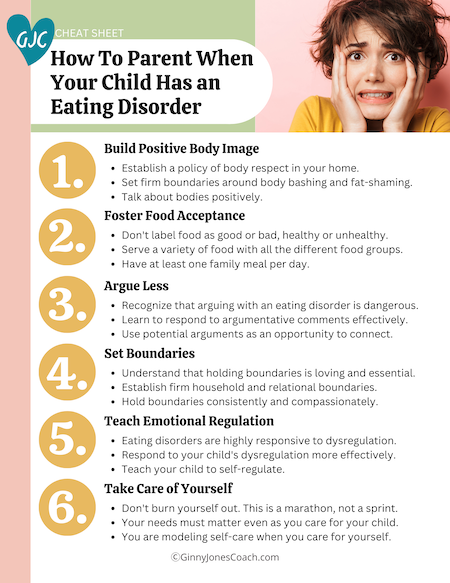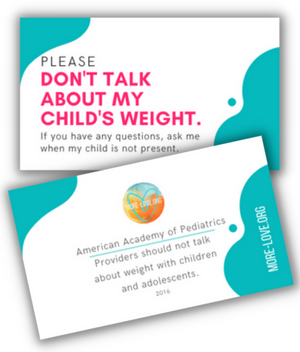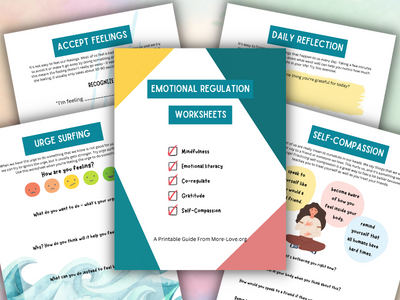
Understand your child’s eating disorder and guide recovery
Parenting a child who has an eating disorder is tricky and complicated, but you don’t have to do it alone – this guide can help! We have hundreds of resources to help you navigate your child’s eating disorder recovery and be the difference-maker in their life.
If you’re feeling overwhelmed and frustrated by eating disorder information that is clinical or terrifying, then welcome to this little corner of the internet where we aren’t afraid to use plain language and make eating disorder information accessible and written specifically for parents. This guide is a great way for parents to understand their child’s eating disorder a little better and start helping them recover!
Parent-Friendly ❤️ Neurobiology ❤️ Attachment ❤️ Non-Diet ❤️ Health At Every Size®
What parents need to know about eating disorders
An eating disorder is a serious diagnosis, and the first thing to know as a parent is that they don’t typically go away on their own. Eating disorders are some of the most complex and sticky mental disorders because they involve food, which we need to eat every day to stay alive.
Beyond the basic facts of needing nutrition to live, feeding and eating are an essential part of the social fabric of being human. We are not machines who can simply live on non-emotional “fuel.” Rather, we are emotional beings built to live and thrive in social groups. Biologically, a human who eats alone is frightened and in danger. That’s why feeding our kids and eating together with our families is a vital part of being a well-functioning person, family, and society.
Unfortunately, today’s society has made eating complicated and divorced it from its emotional and social roots. This attitude has led to consistently increasing rates of eating disorders, and it makes feeding our kids unnecessarily difficult. Luckily, parents have tremendous influence over their child’s feeding and eating environment and can make a huge difference in kids’ recovery.
Free Download: How To Parent A Child With An Eating Disorder
The 6 basic steps you need to follow to help your child recover from an eating disorder.
You are essential to your child’s eating disorder recovery. This guide can help parents understand and respond to their child’s eating disorder more effectively and powerfully.
Parent’s guide to understanding eating disorders
Parents are the single biggest asset in a child’s treatment team for an eating disorder, and yet they are very often left entirely outside of treatment. The history of eating disorder treatment is full of errors and mistakes, including blaming parents for kid’s eating disorders and keeping them in the dark while the “experts” treat the child.
What we know today is that educated, trained parents are a child’s greatest asset and strongest allies in eating disorder recovery. However, this is advanced-level parenting. Parents need a guide and lots of support and training to effectively help a child recover from an eating disorder. But when they do, the impact is HUGE!
Very few parents naturally have the skills to guide a child to recovery, but you’ve got what it takes to succeed! When parents are educated, equipped, and empowered, they supercharge recovery.

How to help your child with an eating disorder
You can help your child with an eating disorder recover. In fact, with guidance and support, you are the best person in the whole world to do so! Kids are biologically hardwired to seek support, guidance, and nourishment from their parents. When an eating disorder enters the picture, parents can feel locked out and stuck. However, there are many things parents can do to get their kids back on track and begin the process of eating disorder recovery. Most notably, parents can take responsibility for the following aspects of eating disorder recovery:
- Learn about eating disorders and your child’s unique causes, symptoms, and treatment plan
- Feed your child regular meals
- Eat with your child
- Create a positive food and body image environment in your household
- Learn about co-regulation and support your child in building their emotional regulation skills
- Facilitate relationships with treatment providers who can address your child’s medical, nutritional, and psychological needs
A parent’s guide to the causes of eating disorders:
The most important thing you can do if you’ve just found out your child has an eating disorder is to learn everything you can about eating disorders. One of the most important things is to know that they are called a “biopsychosocial” disorder, meaning they arise and are supported by a combination of biological, psychological, and social factors. Nobody “chooses” to have an eating disorder, and recovery is never as simple as “choosing recovery.” Approaching treatment without blame and addressing all three of these factors is essential to supporting your child’s recovery.
1. Biological causes of eating disorders
There are biological, genetic foundations that set the stage for an eating disorder. Understanding these biological causes of an eating disorder is essential so that parents don’t misunderstand an eating disorder as a “choice” their child is making, but rather the only solution the child can come up with right now. With a parent to guide them, kids can and do find ways to cope with their biology without using eating disorder behaviors.
2. Psychological causes of eating disorders
There are psychological reasons kids develop eating disorders. We often see eating disorders alongside other conditions like autism and ADHD, for which we have many treatment options to support your child in feeling better and recovering from their eating disorder with their unique neurobiology. Additionally, obsessive compulsive disorder (OCD), anxiety, depression, body dysmorphia, self-harm, and other mental disorders are all treatable mental disorders for which we have extensive treatment options. Parents can help their kids recover from an eating disorder by understanding and providing support for the various mental health conditions that impact it.
3. Social causes of eating disorders
Eating disorders are exquisitely responsive to social conditions. This includes obvious social dangers like weight stigma and diet culture. Parents can counteract and help their kids learn to manage the dangerous social forces that encourage eating disorders. Additionally, eating disorders are sensitive to interpersonal dynamics and stress. Parents can support eating disorder recovery by reducing family stress and guiding their child to build emotional regulation skills.
A resource guide for parents of a child with an eating disorder
Free Download: How To Parent A Child With An Eating Disorder
The 6 basic steps you need to follow to help your child recover from an eating disorder.
Updated Articles About Eating Disorders
How to help your child cope with weight gain in eating disorder treatment
Stephanie’s daughter Nova had been doing well in eating disorder recovery … until she started to gain more weight than she expected and was struggling to cope. “I feel like weight…
Keep readingHow to talk to your adult daughter about her weight
Dear Ginny, I really want to talk to my adult daughter about her weight, which keeps going up. When I get together with her, she binge eats a lot of unhealthy…
Keep readingHow to navigate an eating disorder plus ADHD, autism, OCD, PTSD
Many people who have eating disorders like anorexia, bulimia, binge eating disorder, and ARFID also have ADHD, autism, OCD, and/or PTSD. These conditions are commonly found together and can make treatment…
Keep readingHow to handle your child’s food anxiety
Learning how to handle your child’s food anxiety before, during, and after mealtimes will help your child with disordered eating. You can make a huge difference if you learn how to…
Keep readingHow to cope when you feel traumatized by your child’s eating disorder
When you have a child with an eating disorder it’s natural to feel stressed, and you may even feel traumatized. You’re not alone—studies have found that parents of seriously ill children…
Keep readingClinical hypnotherapy for eating disorder recovery
by Bonnie Killip, Master Clinical & Medical Hypnotherapist Have you ever wondered if hypnotherapy can help with eating disorder recovery? If traditional eating disorder recovery is not progressing, it may be…
Keep readingPrintable Worksheets for Kids-Teens-Young Adults With Eating Disorders PLUS BONUS Parent Scripts
Get all four of our printables and save +70%

About Us
More-Love.org is an online resource that supports parents who have kids with eating disorders. We educate parents about weight, food, and mental health and seek to reduce the fear and shame parents feel when their child has a problem with eating. We believe full recovery from an eating disorder is possible, and we support a non-diet, Health at Every Size® approach. Our eating disorder guide helps parents understand eating disorders so they can support recovery. You are the parent your child needs to recover!
Resource Guide For Parents Who Have Kids With Eating Disorders
Weight-Neutral Healthcare Cards
Worksheets For Kids With Eating Disorders
Guides for Parents

How To Talk To Your Child If They Have An Eating Disorder
Custom-created using concepts from motivational interviewing and interpersonal neurobiology.
- How to have your first conversation about your suspicions (and all the ones that come afterwards!)
- How to respond when your child says they don’t have an eating disorder
- Resource sheets to support parents facing a child’s eating disorder

Parent Scripts For Eating Disorder Recovery
Scripts to help you figure out what to say to help your child with an eating disorder. Use these scripts:
- At the dinner table when behavior is getting out of control
- When you need to set boundaries – fast!
- After something happened so you can calmly review the triggers and events
Quizzes
Non-Diet Resources

Non-Diet/Health At Every Size® Fact Sheets, Guidelines, and Scripts
The BEST WAY to raise a HEALTHY child/teen free from body hate and dangerous eating patterns!
- Fact Sheets About Weight Stigma, Diet Culture, Kids and Diets, and More
- Non-Diet Parent Guidelines
- Non-Diet Parent Scripts About Responding to Fat Talk, Diet Talk, and More
- What to Say/Not Say When Talking About Bodies and Food




















